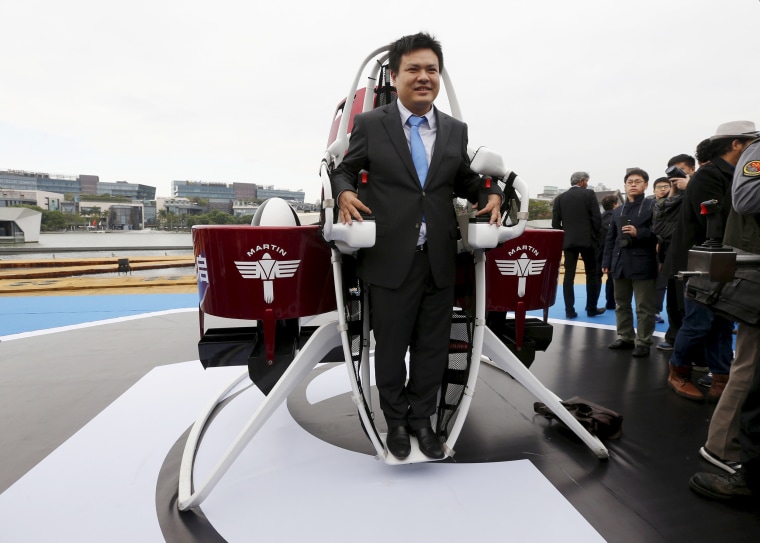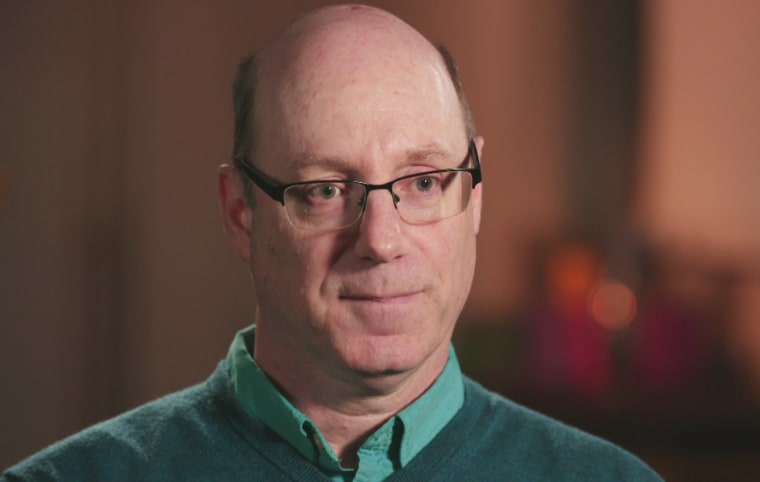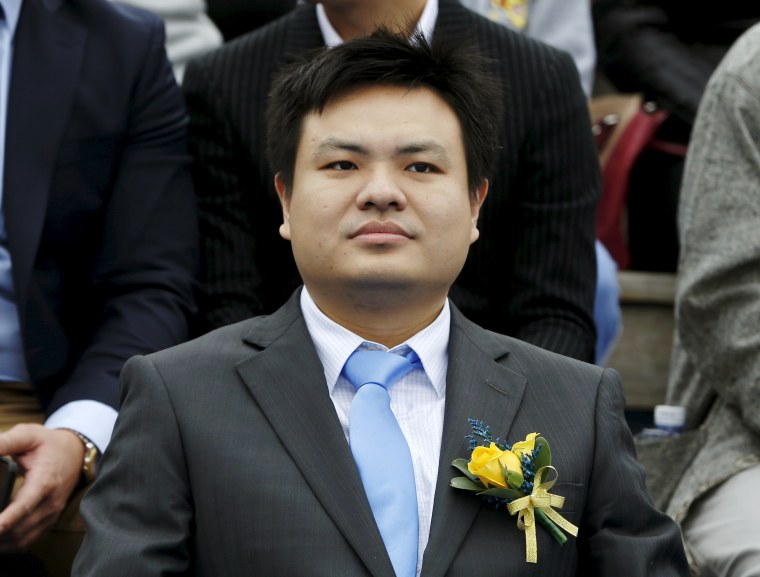Ruopeng Liu believes his work at a Duke lab was simply "fundamental research" that he brought back to China. His former professor thinks otherwise.
By Cynthia McFadden, Aliza Nadi and Courtney McGee
 Liu Ruopeng of KuangChi Science Ltd. poses with a Martin Jetpack, made by New Zealand's Martin Aircraft, during a demonstration at a water park in Shenzhen, China, on Dec. 6, 2015. KuangChi Science Ltd said it will sell the flying machine in mainland China for 1.6 million yuan ($249,902).
Liu Ruopeng of KuangChi Science Ltd. poses with a Martin Jetpack, made by New Zealand's Martin Aircraft, during a demonstration at a water park in Shenzhen, China, on Dec. 6, 2015. KuangChi Science Ltd said it will sell the flying machine in mainland China for 1.6 million yuan ($249,902).
SHENZHEN, China — Meet the man dubbed China's
Elon Musk,
Ruopeng Liu.
Like Musk, he's working on sending people into space, and has already sent them flying.
He's the man behind jet-powered surfboards, and is a multi-billionaire at just 35 years old.
"We call ourselves the future studio," said Liu during an NBC News visit to his company's headquarters here.
"We design the future."
But is he guilty of stealing the intellectual property of a famous American scientist?
Dr. David Smith of Duke University is one of the world's experts on something called "metamaterials."
Liu, who says he had long been a fan of Smith's, came to the U.S. a dozen years ago with the express intent of studying at Smith's lab.
Some observers, including the former assistant director of counterintelligence at the FBI, believe he was actually on a mission from the Chinese government.
Dr. Smith is famous for creating a metamaterial that functions as a so-called "invisibility cloak." Metamaterials, he explains, are "some weird material that doesn't exist in nature."
Dr. Smith's invisibility cloak is not like Harry Potter's famous version as it does not hide things from the human eye, but it does make them invisible to microwave signals.
Dr. Smith's discovery is such a big deal it was even a question on Jeopardy and made the routines of various late night comedians.
The U.S. military saw the potential of the "invisible" material and spent millions supporting Dr. Smith's basic research on optical and electromagnetic material design, with the hope that one day it could be used to protect U.S. forces.
Liu believes his work at the Duke University lab was simply "fundamental research" that he brought back to China.
U.S. law enforcement officials believe it is an example of a trend: Chinese theft of U.S. intellectual property.
Former FBI Assistant Director for Counterintelligence Frank Figliuzzi, now an NBC News analyst, says a lot of valuable research is allowed to walk out the door of American institutions and right into the labs of America's adversaries.
"We know that the Chinese have a shopping list of intelligence and technology that they target every year," said Figliuzzi.
"We know that the research he took from Duke University was on that collection list."
'IT SOUNDS LIKE THEFT'
Liu enrolled at Duke University in 2006.
Students and professors knew him as likeable, directed and very smart.
He was a "sweet kid basically. You'd almost describe him as bumbling a bit," said Dr. Smith.
 Dr. David Smith of Duke University.
Dr. David Smith of Duke University.
He became Smith's protégé.
In late 2007, Liu won Smith's permission to bring two of his old colleagues from China for a visit to Smith's lab.
The two Chinese researchers, whose trip was fully funded by China, worked on a few projects during their three to six-month stay, including the invisibility cloak.
During a trip to the lab one day when Dr. Smith was not present, they took pictures of the lab and its contents, focusing on the apparatus that allows scientists to measure the cloak.
They brought photos and measurements of all the equipment used to fabricate the cloak back to China.
Much to Dr. Smith's surprise, an exact replica was built in Liu's old lab.
"It sounds like theft," said Dr. Smith.
"If we were a company you might think so."
The FBI agreed with Dr. Smith when they opened a case on Liu in 2010.
Said Figliuzzi,
"We know that certain government officials and operatives met with him while he was in the United States."
This case is one of many examples of what experts are saying is an
increasing threat of academic espionage.
According to
Dan Golden, author of "Spy Schools: How the CIA, FBI and Foreign Intelligence Secretly Exploit America's Universities," who first reported on Dr. Smith and Liu, there are now more than a million foreign students in the U.S.
"A significant percentage of those students," said Golden, "are here to siphon off research or recruit informants and gather intelligence." KuangChi Science Ltd Chairman and Executive Director Liu Ruopeng attends a demonstration of a Martin Jetpack, made by New Zealand-based Martin Aircraft, at a water park in Shenzhen, China, on Dec. 6, 2015.
KuangChi Science Ltd Chairman and Executive Director Liu Ruopeng attends a demonstration of a Martin Jetpack, made by New Zealand-based Martin Aircraft, at a water park in Shenzhen, China, on Dec. 6, 2015.
Liu strongly denies any wrongdoing.
When NBC's Cynthia McFadden went to Liu's company headquarters in Shenzhen and asked him if the Chinese government had sent him to Duke University to learn from Dr. Smith and bring his information back, Liu called the claim "ridiculous" and "far away from the truth."
During that same visit to Liu's headquarters, NBC News couldn't help but notice that an advanced version of Dr. Smith's invisibility cloak is proudly displayed in the lobby.
'EVERYTHING HE DID WAS EXPLAINED AWAY'
The FBI closed its case on Liu a few years ago, citing a shortage of evidence, much like Dr. Smith.
"I didn't have any evidence and everything he did was explained away," said Dr. Smith.
When Liu created a website about a metamaterials company that was Duke property, Liu told Smith that it was only to make him look good for an upcoming job interview.
When Liu put Dr. Smith's name on scientific articles without his knowledge, Liu cried when confronted with the ethical breach and said it was a misunderstanding.
That is, until after Liu graduated in 2009 and an email he appeared to have sent to a classmate emerged — an email Dr. Smith says shows from the very beginning Liu intended the Chinese should profit from Dr. Smith's research.
In the email, which was reviewed by NBC News, Liu admits that he had been withholding his intentions from Dr. Smith all along and says that he had simultaneously been working towards commercializing Dr. Smith's research in China while working in the Duke lab.
Had the email emerged before Liu graduated, Dr. Smith says that he would not have gotten a degree from Duke University.
He does have a degree from Duke University, and he went home to China with that Ph.D and launched his tech company, now valued at $6 billion.
The current Chinese president made a bee-line for the tech company directly after his election, making it the first company he visited as president.
This relationship was a red flag for the FBI, despite the lack of evidence for a criminal case.
"Was he handled, approached, compromised, recruited, and subsidized when he took it back to China? My theory says yes," said Figliuzzi.
"This was more than just a grad student taking something that didn't belong to him."
This theory does not concern Liu, who views scientific invention as a necessary collaboration.
"I don't want to use the word copy," said Liu.
"People can share the experience…and build something…different."


 FBI Director Christopher Wray.
FBI Director Christopher Wray. The US and China have increasingly began butting heads in less of a rhetorical sense, and
The US and China have increasingly began butting heads in less of a rhetorical sense, and  Liu Ruopeng of KuangChi Science Ltd. poses with a Martin Jetpack, made by New Zealand's Martin Aircraft, during a demonstration at a water park in Shenzhen, China, on Dec. 6, 2015. KuangChi Science Ltd said it will sell the flying machine in mainland China for 1.6 million yuan ($249,902).
Liu Ruopeng of KuangChi Science Ltd. poses with a Martin Jetpack, made by New Zealand's Martin Aircraft, during a demonstration at a water park in Shenzhen, China, on Dec. 6, 2015. KuangChi Science Ltd said it will sell the flying machine in mainland China for 1.6 million yuan ($249,902). Dr. David Smith of Duke University.
Dr. David Smith of Duke University. KuangChi Science Ltd Chairman and Executive Director Liu Ruopeng attends a demonstration of a Martin Jetpack, made by New Zealand-based Martin Aircraft, at a water park in Shenzhen, China, on Dec. 6, 2015.
KuangChi Science Ltd Chairman and Executive Director Liu Ruopeng attends a demonstration of a Martin Jetpack, made by New Zealand-based Martin Aircraft, at a water park in Shenzhen, China, on Dec. 6, 2015.